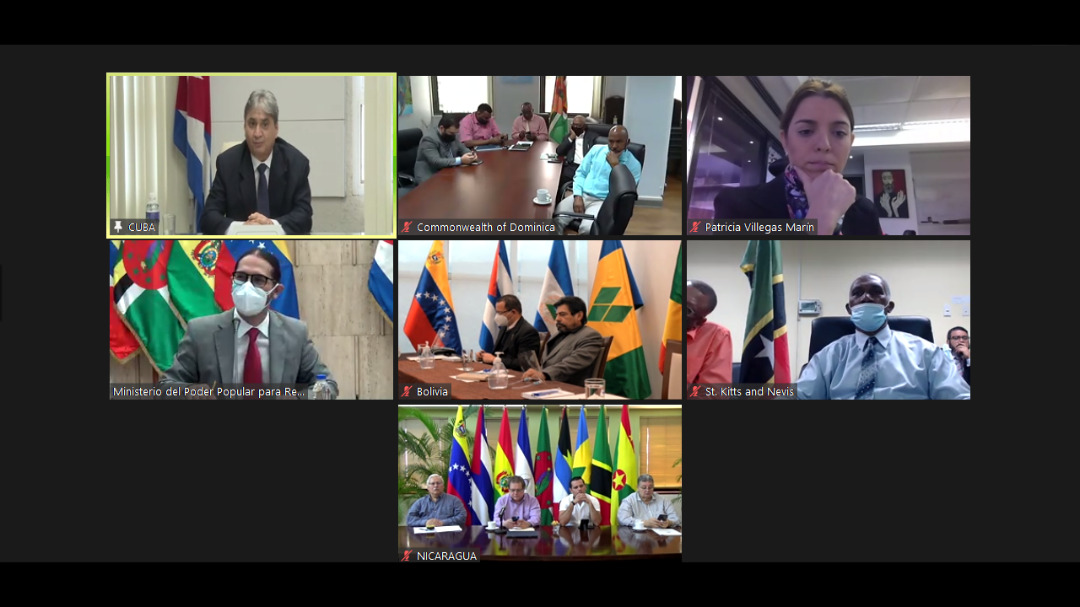In order to improve the communication policy of the Bolivarian Alliance for the Peoples of Our America (ALBA-TCP), Executive Secretary Sacha Llorenti opened on Monday the ALBA-TCP Meeting of Communication and Information High-ranking Authorities.
At the virtual meeting, the authorities and representatives of ALBA-TCP member countries moved forward with a roadmap for political communication actions to strengthen the ALBA-TCP’s international presence and voice by upgrading communication policy to a new level.
In his opening statement, the ALBA-TCP executive secretary stressed that the regional bloc held this meeting to upgrade its communication policy, understanding it as a tool of great value to promote encounters and integration, and give prevalence to the truth, ethical principles and international law.
“We are guided by love, peace, and justice, not hatred […] In ALBA we build a different model to give prevalence to human beings and nature over merchandises or capital,” added Llorenti.
In that same vein, Bolivia’s Communication Vice-minister Gabriela Alcon Merubia said that ALBA-TCP is an important space to make our voice heard throughout America.
“We must strengthen and expand our message to all the possible media with sovereignty […] and join all our efforts and capacities to do the communication battle. We cannot let what Bolivia experienced happen again,” warned the Bolivian vice-minister.
Likewise, Alcon Merubia recalled and condemned the media blackout experienced by the Bolivian people, the use of social media to persecute an stigmatize amid the 2019 coup, and attacks against alternative media.
Also, the President of the Cuban Institute of Radio and Television, Alfonso Noya, insisted on the need of creating a public communication and information system to manage communication from the perspective of a more inclusive model.
Likewise, Noya condemned that Venezuela, Nicaragua and other ALBA-TCP member states have been the target of unilateral coercive measures that encapsulate the empire’s aggressivity expressed in a permanent war of symbols.
“If we assume that culture, education and communication play a fundamental role in the process of economic development and democratization, we will agree on their extraordinary contribution to the transforming construction of a nation project and the ALBA’s aspiration of a community,” he added.
Regarding the role of the ALBA-TCP member countries, the representative of Saint Kitts and Nevis expressed the need of making the governments’ efforts visible to defend the life of their people amid the COVID-9 pandemic.
Furthermore, he condemned that the great powers and media corporations, as well as social media, censor official information, particularly that of ALBA-TCP countries, thus violating the people’s right to freedom of expression, access to quality, timely information, and disturbing their right to peace.
Joint Agenda
Venezuela’s Vice-president of Communication, Culture and Tourism, Freddy Ñáñez, urged ALBA-TCP to build a joint agenda including alternative, popular media “so that they be spaces of defense to dismantle fake news against our countries.”
The President of multi-state TV network Telesur, Patricia Villegas, asserted that “it is imperative to work as a network, to create a community and build agendas so that our existence as nations is not destroyed.”
Villegas said that Telesur is an expression of ALBA-TCP’s integration, “a media outlet that shows us how similar we are, unlike those media outlets in charge of showing our differences and conflicts.”
In this important meeting, Villegas recalled that “Commanders Fidel Castro and Hugo Chávez envisioned a continental channel capable of building an informative agenda hand in hand with the organized popular power,” giving birth to Telesur.
